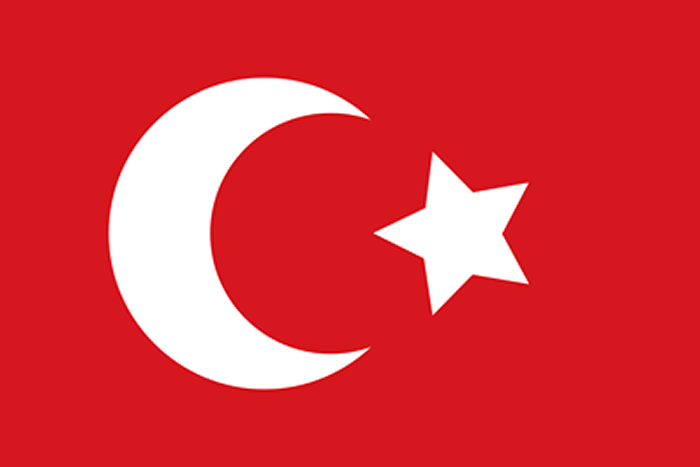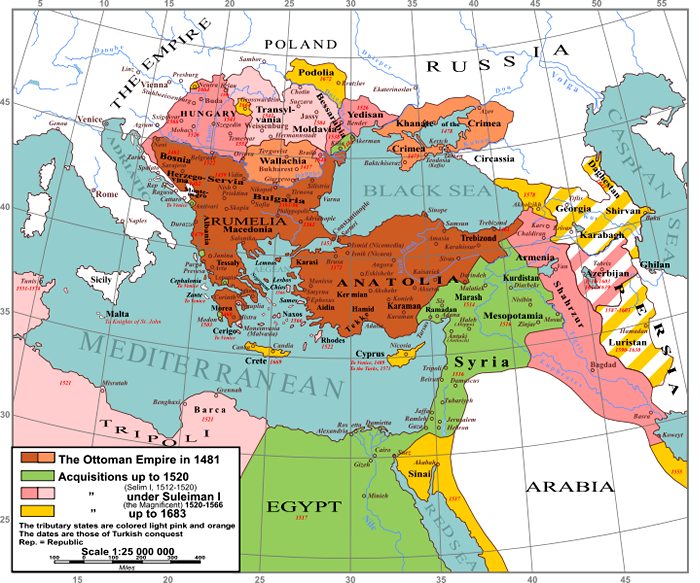 Ottoman Empire
Ottoman Empire

(Text by Duane R. Hurst © 2013)
Click on a link to view its information and pictures.
|
OTTOMAN LINKS: Significant Event: Battle of Lepanto in 1571 AD Battle of Mohács in 1526 AD Battle of Nicopolis in 1396 AD Siege of Constantinople 1453 AD Main Cities: Belgrade; Istanbul Time: 1299-1923 AD Language: Turkish Personage: Murat II; Suleiman Religion: Islam Religion Related Country: Turkey Brief History: I have included only a few items concerning the history of this empire. A good source for more details can be found on Wikipedia or in history books. |
|
|
EARLY YEARS:
Osman Bey of the Oghuz Turks established the Ottomans in northwest Anatolia, when he declared independence from the Seljuk Sultanate of Rum in 1299 AD. His son, Orhan Bey, captured Bursa in 1324 AD and made it the capital city. Two key victories were: capture of Thessaloniki from Venice in 1387 AD; defeat of Serbs at Kosovo in 1389 AD. Christian forces failed to halt Ottoman advances in the last crusade at Nicopolis in 1396 AD. Byzantine forces received a temporary respite when Timur defeated the Ottomans at Ankara in 1402 AD. After the battle, Timur captured Sultan Bayezid and nearly destroyed the Ottoman Empire. Only Timur's death three years later prevented its collapse. EMPIRE & EASTERN EUROPE: In 1453 AD, Mehmed II conquered Constantinople, which likewise launched the Ottoman Empire. Selim I (1512-1520 AD) defeated the Safavid dynasty of Persia in battle at Chaldiran (modern monument). He also seized Egypt and built a navy in the Red Sea. The empire reached its zenith under the reign of Suleiman the Magnificent (1520-1566 AD). He invaded the Balkan region, capturing Belgrade in 1521 AD and seizing much of Hungary after the Battle of Mohács in 1526 AD. However, he was unsuccessful with a siege of Vienna in 1529 AD. Suleiman also wrested Baghdad and Mesopotamia from Persia. Ottoman rulers likewise reduced the power of Venice through a series of wars. They captured fortresses at Argos and Negroponte. In 1499 AD, Venice allied with France and fought another war with the Ottomans. They lost a sea battle at Zonchio. A coalition of 208 Christian ships, including 110 galleys, soundly defeated a similarly large Ottoman fleet at Lepanto in 1571 AD. However, Ottomans seized the last Venetian stronghold on Cyprus at Famagusta during the same period. In 1714 AD, the Turkish Ottomans declared war with Venice and eventually seized the Kingdom of Morea. NAPOLEONIC WAR: In 1798 AD, Napoléon Bonaparte led a military expedition against Egypt. His force landed at Alexandria and defeated the Mamluks under Murad Bey at Shubra Khit. During a July Battle of the Pyramids, Napoléon utilized a battle square to defeat another Mamluk force. However, his troops suffered a decisive defeat in Battle of the Nile. British Rear-Admiral Horatio Nelson's ships destroyed the French flagship, L'Orient and most of the French fleet. In 1807 AD, troops under Umar Makram demolished a British force at Rosetta. TURMOIL IN EUROPE: The Greek War of Independence (1821-1832 AD) presented western Europe with a dilemma, as they were not sure how to handle degeneration of the Ottoman Empire. On 20 October 1827 AD, a combined naval force from France, Great Britain and Russia defeated an Ottoman armada in the Battle of Navarino. Greek troops won a battle at Petra (26-28 July 1829 AD), which resulted in Greek independence. CRIMEAN WAR: In October 1853 AD, Russia declared war with the Ottomans and attempted to seize the Crimean peninsula. To prevent Russian expansion in the region, a coalition (Britain, France and Sardinia) helped the Ottomans. Russian forces destroyed an Ottoman fleet at Sinop, but eventually lost a fortress at Sevastopol and the Black Sea became a neutral area. A British "Charge of the Light Brigade" during the battle of Balaclava was immortalized. WORLD WAR I: In August 1914 AD, a "Young Turk" government signed a secret treaty with Germany. Ottomans gained a few early victories during World War I: Battle of Gallipoli and Siege of Kut. In 1915 AD, a Russian army and Armenian volunteers invaded the Caucasus region. Ottomans responded by slaughtering between 1 and 1.5 million people in the Armenian Genocide. Ottomans lost most of their territory during an Arab Revolt in 1916 AD and to victorious allied forces at the end of World War I. A Turkish war of independence (1919-1922 AD) resulted in Ottoman collapse and exile for the Sultan and his family. |
|
|
© Page Publisher: Duane R. Hurst
|


